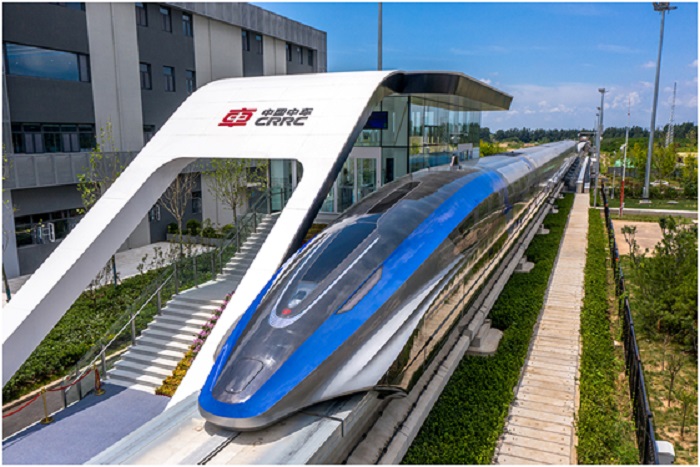



A high-speed maglev system with a maximum speed of 600 km/h rolled off the assembly line in Qingdao, east China’s Shandong province on Tuesday.
The train, independently developed and manufactured by China Railway Rolling Stock Corporation (CRRC), a Chinese supplier of rail transit equipment, is the world’s first 600 km/h maglev train, as well as the speediest ground vehicle globally.
High-speed maglev technology is at the frontier of global rail transit development. The 600 km/h maglev system marks that China has mastered a complete set of high-speed maglev train engineering technologies.
The 600 km/h maglev train adopts mature and reliable normal conducting technology that repels and pushes the train up off the track. It is fast, efficient, safe, and reliable, offering high-capacity, flexible, punctual and green services.
The maglev train project started five years ago, witnessing a number of technological breakthroughs and advances. The project independently developed and manufactured a five-carriage engineering prototype with a designed top speed of 600 km/h, and systematically tackled technological barriers in acceleration, adaptability to complicated environment, and localization of core systems. It also made huge strides in the development of complete-set high-speed maglev train engineering technologies, including system integration, vehicle production, traction power supply, rail trails, and transport control and communication.
At present, the maximum operational speed of high-speed rail services stands at 350 km/h, while the typical cruising airspeed of passenger aircraft is 800 to 900 km/h. As a new form of high-speed transit, the maglev train is able to fill the market vacancy. Besides, it can travel with two to 10 carriages, with each carrying as many as over 100 passengers. The levitated train is free from wheel-track friction, so it needs little maintenance and lasts longer between each overhaul.
As the fastest ground vehicle available, the train provides the best solution for trips within a range of 1,500 km. For instance, it takes approximately 4.5 and 5.5 hours to travel door-to-door from Beijing to Shanghai by air and by high-speed rail, respectively, while the time is cut to around 2.5 hours by a high-speed maglev train.
It is reported that engineers have completed the integration of the maglev transportation system, and a train with five carriages has been running well on a test line within the factory. China will further trial runs of the system and advance semi-industry experiments to promote continuous innovation and industrialization of relevant technologies, and drive its high-end manufacturing upgrade and development of emerging sectors of strategic importance.


The Executive and members of the.


The Acting Director, FCT Directorate of.


President Bola Ahmed Tinubu has been.



Barely a month after resignation of.


An Abuja based Legal Practitioner, Osuagwu.



Convener of Equitable Remedy, Mrs. Magaret.


Contractors handling the contract for city.


Nigerian government may have concluded plans.


The Diplomatic Correspondents Association of Nigeria.


A rights group, “Follow Me Talk.
Leave a Comment